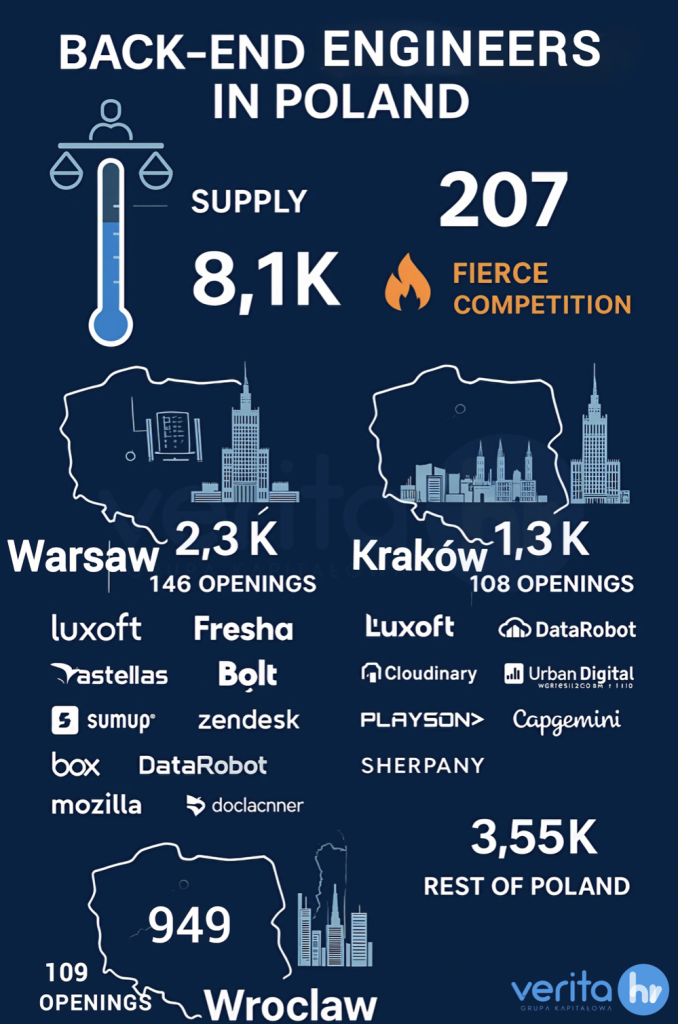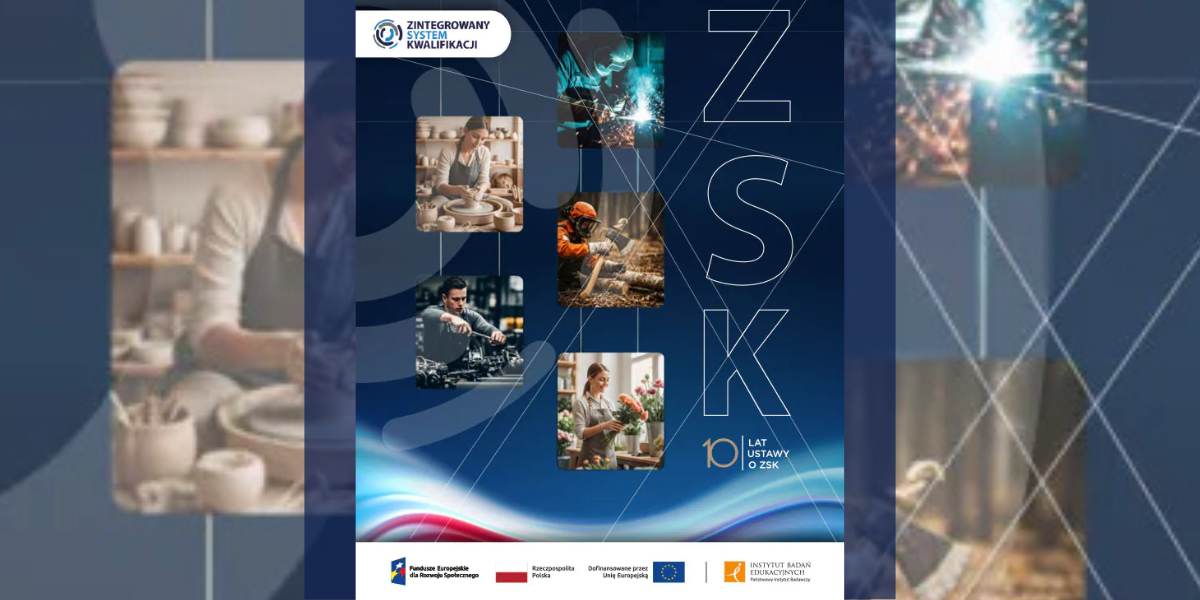Poland’s tech job market rebounded strongly in 2025, with IT vacancies surging by about 68% year-on-year. As a leading European tech hub, home to over 400,000 IT professionals, Poland still faces intense competition for certain specialists. Back-end engineers are at the center of this demand boom.
These developers build and maintain the core systems behind applications, and businesses across Poland (and Europe) are scrambling to secure experienced back-end talent to drive their digital products forward. The result is a high-demand, fast-moving market for back-end engineers in Poland’s tech economy.
Back-End Engineer Demand Poland 2025
Every mobile app, e-commerce site, or cloud platform relies on robust back-end development. In fact, the “invisible architecture behind every digital service” depends on back-end engineers. These professionals handle server-side logic, databases, APIs, and system integrations that keep applications running smoothly behind the scenes.
According to HR Projects Coordinator for Verita HR Group, Iwona Jagieł, “Back-end engineers have become the backbone of digital transformation – they ensure the reliability, scalability, and security of systems used by millions of users.”
A mastery of languages like Java, Python, and C# remains essential for powering enterprise applications and SaaS systems. Because back-end code underpins security, scalability, and performance, skilled back-end engineers are foundational to any serious tech project. In short, they make the shiny front-end features possible, and their work keeps critical platforms stable and efficient day in and day out.
Demand for Back-End Engineers
Despite Poland’s large talent pool, seasoned back-end engineers are relentlessly pursued by employers.
According to Verita HR Group data, there is roughly 8,100 back-end professionals in Poland, including 2,300 in Warsaw, 1,300 in Kraków, and 949 in Wrocław. However, only 363 active job offers were listed nationwide in the last few months, clear proof that supply is tight and the competition for proven engineers is fierce.
Warsaw leads with 146 openings, where companies like Luxoft Poland, Fresha, Astellas Pharma, Bolt, SumUp, and Zendesk are scaling back-end teams to support global SaaS and fintech operations. Other key employers include Box, DataRobot, Mozilla, Docplanner Tech, and Nord Security, all of whom are investing heavily in modernizing their back-end architecture.
Krakow follows with 108 active listings, led by Luxoft Poland, DataRobot, and Cloudinary, with Playson, Capgemini, and SHERPANY also strengthening local engineering hubs. The city’s blend of R&D centers and startup energy keeps demand for full-stack and back-end specialists consistently high.
Wroclaw hosts 109 openings, driven by Luxoft, and DataRobot, alongside EPAM Systems, Objectivity, and Capgemini. Employers here prioritize developers skilled in scalable architecture and microservices, core to supporting enterprise-grade digital products.
The competition isn’t just local; many Western European and US companies have set up hubs in Poland, further boosting demand and pushing employers to move fast and offer more to secure top back-end talent.
In short, back-end engineers are the backbone of Poland’s tech ecosystem. They design data pipelines, APIs, and system logic that keep everything running. Employers across Poland are competing to hire those who can keep products fast, secure, and resilient
 Source: Verita HR Group
Source: Verita HR Group
Skills and Salary Expectations for Back-End Engineers
Polish employers hiring back-end engineers now look for a strong command of modern back-end stacks and are willing to pay accordingly. Proficiency in Java (often with Spring framework), Python (with Django or Flask), or .NET/C# is commonly required, alongside experience with SQL/noSQL databases and cloud platforms (AWS, Azure, or GCP). Familiarity with microservices architecture and container tools (Docker, Kubernetes) is increasingly a baseline expectation.
Iwona underscored this challenge, explaining that “As cloud adoption accelerates and business applications grow in complexity, demand is rising for professionals who combine deep technical expertise with architectural thinking.” She continued: “These capabilities are especially valued in Poland, where competition for experienced back-end talent remains exceptionally strong.”
Given the complexity of back-end systems, most openings target mid-level and senior developers who can design scalable solutions and troubleshoot tough issues. Correspondingly, salaries for experienced back-end engineers are high.
Mid-level back-end developers in Poland earn around 18,000 PLN gross per month, while senior back-end engineers command about 20,000–30,000 PLN monthly on average. Top specialists at leading companies can even reach the 30,000 PLN+ range.
This benchmark reflects a competitive market where candidates with the right skill sets (and a few years of experience) have significant bargaining power. Employers have responded by not only boosting pay but also providing perks like remote work options and training budgets to attract and retain the best back-end talent.
Where can employers find this talent now? Verita HR knows exactly where and how.
Verita HR’s Strategic Edge in Back-End Hiring
In a market this tight, finding experienced back-end engineers can take months. Verita HR Group changes that equation. With over a decade of experience recruiting across Poland’s tech sector, Verita HR has built deep networks of developers skilled in Java, Python, C#, and cloud frameworks like AWS, Azure, and GCP.
Recruiters from Verita HR maintain direct relationships with top engineers in Warsaw, Kraków, and Wrocław, including both active candidates and the hard-to-reach passive talent who aren’t visible on job boards. This allows them to cut time-to-hire dramatically while ensuring technical and cultural fit. Unlike traditional agencies, Verita HR doesn’t just source resumes, they connect employers with developers who can immediately deliver. Whether building APIs for fintechs, scaling platforms for SaaS giants, or optimizing systems for global enterprises, they help clients secure the back-end talent that powers long-term growth.
For any business looking to secure top back-end engineering talent in Poland’s crowded market, partnering with Verita HR is the surest way to find the right people and do it quickly and intelligently.
Ready to hire from the best Polish candidate poll available today? Contact Verita HR’s IT recruitment specialists today to find Poland’s top Scrum Master candidates.
Verita HR offers services including RPO | Permanent Recruitment | Outsourcing | Media Services






